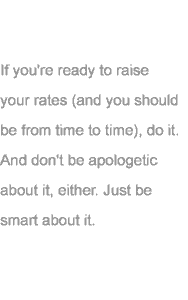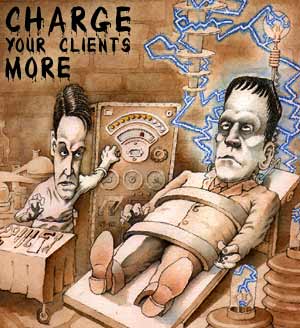|
"Basically the going rate is only good for going down the drain."
Matching competitors' rates without analyzing your own business operations and marketplace is a recipe for financial woe. Are you working in a city like San Francisco or New York where the cost of living is high? Don't try to underbid a competitor in Cheyenne, Wyoming. He may be renting an entire office for what it costs you to take a client to dinner. Do you have 15 years of experience in your profession? Don't throw a "fire sale" for your services just to match the new guy's prices. Remember, he may take three times as long to complete a job that you can do overnight.
Instead of following the pack, get out your calculator. If you currently put in about 1,000 billable hours a year, how much would you have to charge per hour to meet expenses and live comfortably on your income?
Let's take Connie Consultant as an example: Connie currently charges $55 an hour and bills 1,000 hours a year. This brings in $55,000 ($55 x 1,000). But Connie is finding that her overhead costs, out-of-pocket expenses, and taxes are leaving her strapped for cash. Because she has a lot of business -- more than she can handle -- she decides to raise her hourly rate.
To meet her expenses and live comfortably while working the same 1,000 hours a year, Connie figures she needs to earn about $80,000 a year. To determine her new hourly rate, therefore, she divides $80,000 by 1,000 hours, which equals $80 per hour. This means that Connie must raise her hourly rate by $25 (from $55 to $80).
Of course, the process by which you calculate your rate increase may be far more complicated than Connie's. Your billable hours may fluctuate each year, for example, or your expenses may vary wildly from month to month. You may even be depending heavily on two or three clients whose accounts are the difference between the red and the black.
Whatever your situation, force yourself to sit down and do the math. Pull out your records. (If you find yourself awash in illegible notes, half-completed balance sheets, and crumpled 1099s, consider hiring a "paid pencil" -- either a bookkeeper, accountant, or financial manager to help you with the deed.) Review your past years' invoices, time sheets, receipts, and tax records. (You have been keeping track of these -- haven't you?) Then estimate your previous years' income, billable hours, expenses, and desired annual profit as best you can. Imagine yourself the CEO of a public company. What would your shareholders demand to know about your business?
The billable hours you work and the fees you're paid are excellent indicators of your productivity and profitability, and therefore of your "natural" rate. Don't sabotage yourself by refusing to number-crunch.
Lowering the Boom, Gently
IPs who are considering raising their fees by more than ten percent may need to re-evaluate their current client pool. If your current customers aren't likely to afford you any longer, you may need to begin soliciting larger accounts, says business professor and consultant Charles Popovich. And if you're moving into the big leagues, you may have to become more sophisticated in your business dealings and marketing tactics.
Again, fear not. Whether you're raising your rates by $1 an hour or $100 an hour, there are ways to make your announcement more palatable. Your clients will want to know three things: how much money you intend to charge them, when your higher rates will go into effect, and why you're increasing your fees.
First of all, give your clients reasonable notice. Don't ambush them with a sudden fee hike. If possible, make the announcement in person -- or, at least, by telephone. This allows you to receive instant feedback from your clients about the planned hike.
Be firm. Don't over-explain. Don't apologize. Most of all, don't give the impression that you're raising your rates in desperation.
"I actually had one person say to me, 'I have to raise my rates because I don't have enough business,'" says Moses. "And I'm supposed to pay for her problem?"
Instead, explain the increase matter-of-factly. State when it will go into effect, and briefly inform your clients why you must take this
action. Some explanations given by IPs include:
- The Annual-Rate-Hike Reason: "I raise my rates 10 percent each year."
- The More-For-Your-Money Reason: "I'll be adding extra services that will greatly benefit your company."
- The Rising-Cost-of-Doing-Business Reason: "I'm keeping my fees reasonable, but I'm making allocations for increases in my overhead
expenses."
|



